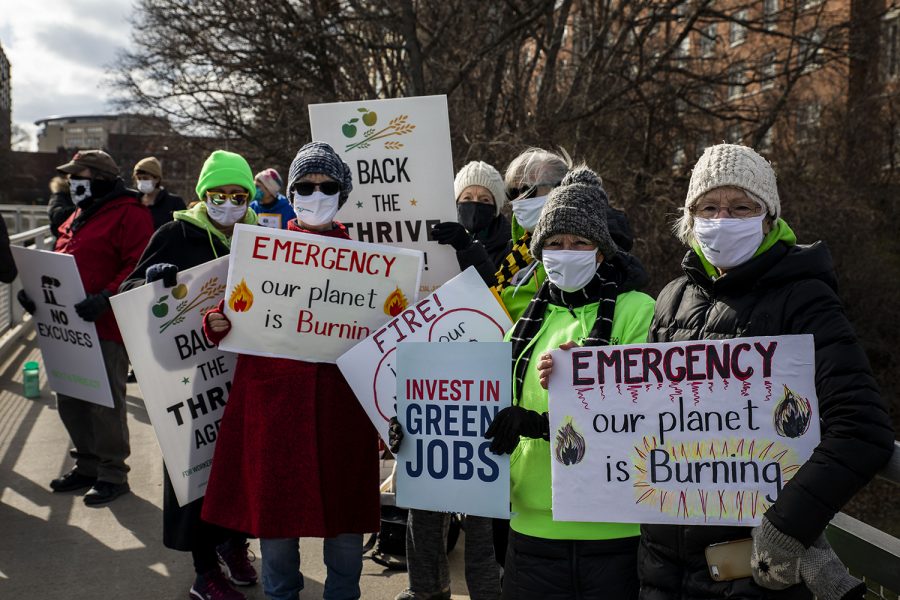Guest Opinion | 2021: A year of climate change and records broken
If we want to stabilize the climate, we need to act soon.
A group of people pose for their portraits and to show their signs on Wednesday, March 31, 2021. Iowa Citizens for Community Change held the rally on the Riverside Dr. overpass.
January 20, 2022
Extreme climate events led the news in 2021. Among the rarest events, an unprecedented heat wave in the Northwest that busted all records. Portland was scorched by an average high temperature of 112 degrees Fahrenheit from June 26-28, when normal high temperatures are in the 70s.
Seattle, Washington, set an all-time heat record of 104 degrees Fahrenheit on June 27. The next day, the record was obliterated by a high temperature of 108 degrees. Prior to that, Seattle had recorded only three days with temperatures exceeding 100 degrees in over a century. In 2021, climate records were not simply broken. They were shattered.
Canada couldn’t escape the heat either. Lytton, British Columbia broke the all-time high temperature record for the entire country on June 29 at 121 degrees Fahrenheit. Imagine, fracturing the high temperature record for the entire country by 8 degrees.
Iowa’s highest statewide temperature dates back to July 14, 1936 at 108.8 degrees Fahrenheit. Thus, Lytton was more than 12 degrees hotter than Iowa ever has experienced in recorded history, even though Lytton is more than 500 miles further north. Climate experts determined that this heat wave was virtually impossible without man-made greenhouse gasses in the atmosphere.
Broken records were not limited to heat waves in 2021. From Dec. 10-11, six states in the U.S. experienced a family of tornadoes that was by far the worst ever recorded so late in the year. The hardest-hit was Kentucky, which experienced an EF-4 long-track tornado traveling over 165 miles with gusts of wind up to 190 mph.
Mayfield, Kentucky was destroyed. In all, more than 80 people died. Later that week, Iowa was not spared when a rare derecho swept through the state on Dec. 15. It was the second derecho in Iowa in 16 months, and the first-ever derecho in December anywhere in the US. It spawned 92 tornadoes, including 43 in Iowa, the most twisters in a single day in the state’s historical record.
Who analyzes the trends of climate change? The United Nations Intergovernmental Panel on Climate Change (IPCC) released its sixth report (AR6) on the Physical Science Basis for climate change.
Each report since 1990 has become more sobering — and certain — that these extreme climate events are a result of human-induced warming. UN Secretary General António Guterres called the report a “code red for humanity.” Authors stated with high confidence, “evidence of observed changes in extremes such as heatwaves, heavy precipitation, droughts, and tropical cyclones has strengthened since the last report, 2013.”
Multiple lines of evidence document that Earth’s climate is changing beyond the realm in which human civilization developed over the past 10,000 years.
In December 2021, diplomats from 197 countries, including 120 heads-of-state, met in Glasgow, Scotland for the UN’s twenty-sixth Conference of the Parties (COP26). They agreed to transition to a low-carbon economy, but progress fell short of ensuring the goals: a 45 percent decline in human-caused greenhouse gas emissions by 2030 and net-zero emissions in 2050, which would limit global warming to 1.5 degrees Celsius (2.7 degrees Fahrenheit).
Unfortunately, we are not on a path towards meeting those goals. While the average level of planetary warming is currently 1.1 degrees Celsius (2.0 degrees Fahrenheit), we are following a scenario towards 2.7 degrees Celsius (4.9 degrees Fahrenheit) in coming decades, more than twice what we have experienced so far.
Indeed, the stakes are very high. We still have time to stabilize our climate, but we must act soon. Climate science should be a part of every college curriculum — each student should be knowledgeable of how it will affect their world for decades to come.
-Jerry Schnoor, professor of civil and environmental engineering and co-director of the Center for Global and Regional Environmental Research at the University of Iowa



